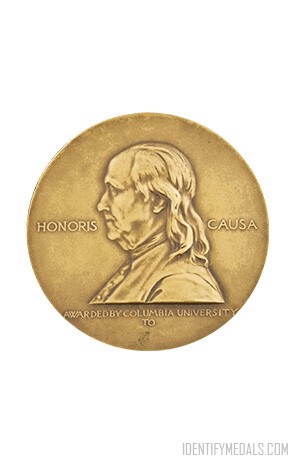The Pulitzer Prize Medal is an esteemed award presented to honor outstanding achievements in journalism, literature, and musical composition in the United States.
The Pulitzer Prize Medal is one of the most prestigious awards in the fields of journalism and the arts, recognizing excellence and integrity. In fact, winning a Pulitzer can significantly boost a recipient’s career, bringing widespread recognition and often leading to broader dissemination of their work.
Winning a Pulitzer Prize is a mark of high distinction, often significantly enhancing the careers of journalists, writers, and composers. The awards serve as a benchmark for excellence in journalism and the arts, encouraging high standards and recognizing the profound impact of investigative reporting and storytelling on society. The Pulitzer Prize continues to honor excellence and innovation, upholding the legacy and vision of its founder, Joseph Pulitzer.
The Importance of the Pulitzer Prize Award
The Pulitzer Prizes were established in 1917 by provisions in the will of Joseph Pulitzer, a Hungarian-American journalist and newspaper publisher who left funds to Columbia University upon his death to establish the award and the School of Journalism.
Columbia University in New York City administers the Pulitzer Prizes, with a board of jurors, known as the Pulitzer Prize Board, overseeing the selection of winners. This board includes esteemed journalists, academics, and notable figures from various artistic disciplines. The number of categories has grown to 21, reflecting a broad range of journalistic writing and reporting, as well as recognizing achievements in books, drama, and music. The inclusion of the music category in 1943 marked a significant expansion, honoring distinguished musical compositions by American composers.
Today, the Pulitzer Prize Medal not only honors exceptional work but also serves to uphold high standards in journalism and the arts, encouraging future generations to strive for excellence in these fields.
Awards are given in various categories such as Public Service, Breaking News Reporting, Investigative Reporting, Explanatory Reporting, and Feature Writing. Categories include Fiction, Drama, History, Biography or Autobiography, Poetry, General Nonfiction, and Music (more information on categories below).

A Short History of the Pulitzer Prize
The Pulitzer Prize has a rich history dating back to the early 20th century. Its origins trace back to Joseph Pulitzer, a Hungarian-American journalist and newspaper publisher who played a significant role in the development of modern journalism through his ownership of the New York World and the St. Louis Post-Dispatch. Upon his death in 1911, Pulitzer bequeathed a substantial portion of his estate to Columbia University with the intent of establishing a School of Journalism and funding the Pulitzer Prizes.
The inaugural Pulitzer Prizes were awarded on June 4, 1917, initially comprising four journalism awards and four literary awards, along with a scholarship for journalism students. The original categories included Public Service, Reporting, History, Biography, and Novel. Over the years, the scope of the prizes has expanded significantly to accommodate the evolving landscape of journalism and the arts.
In recent years, the Pulitzer Prizes have adapted to the digital age by recognizing achievements in online journalism and multimedia storytelling. Among the most prestigious awards is the Public Service Pulitzer, which is given to a news organization for meritorious public service through extensive use of journalistic resources.
Pulitzer Prize Awardees
Here are some examples of Pulitzer Prize winners across different categories:
Journalism
Public Service
- The New York Times (2021): For its coverage of the COVID-19 pandemic.
- The Washington Post (2014): For its extensive revelations of the NSA’s surveillance activities, based on the work of Edward Snowden.
Breaking News Reporting
- The Staff of the Los Angeles Times (2020): For its coverage of the mass shooting in San Bernardino, California.
- The Staff of The New York Times (2019): For coverage of the Trump administration and its implications.
Investigative Reporting
- The Wall Street Journal Staff (2019): For its coverage of President Trump’s secret payoffs to two women during his campaign.
- Jodi Kantor and Megan Twohey of The New York Times, and Ronan Farrow of The New Yorker (2018): For their reporting on Harvey Weinstein’s sexual abuse allegations.
Music
- Kendrick Lamar (2018): For his album “DAMN.,” the first non-classical, non-jazz work to win the Pulitzer Prize for Music.
- Du Yun (2017): For “Angel’s Bone,” an opera about human trafficking.
Literature
Fiction
- Colson Whitehead (2020): For “The Nickel Boys,” a novel about reform schools in Jim Crow-era Florida.
- Donna Tartt (2014): For “The Goldfinch,” a novel about a boy who survives an explosion at a museum.
Drama
- Michael R. Jackson (2020): For “A Strange Loop,” a musical that explores the thoughts of a Black, gay writer.
- Martyna Majok (2018): For “Cost of Living,” a play examining the interactions between able-bodied and disabled individuals.
History
- David W. Blight (2019): For “Frederick Douglass: Prophet of Freedom,” a biography of the former slave turned abolitionist.
- T.J. Stiles (2016): For “Custer’s Trials: A Life on the Frontier of a New America,” a biography of George Armstrong Custer.
Biography or Autobiography
- Les Payne and Tamara Payne (2020): For “The Dead Are Arising: The Life of Malcolm X,” a comprehensive biography of the civil rights leader.
- Caroline Fraser (2018): For “Prairie Fires: The American Dreams of Laura Ingalls Wilder,” a biography of the “Little House on the Prairie” author.
The Pulitzer Prize Medal Design
The Pulitzer Prize Medal features a relief of Benjamin Franklin, who is considered one of the founding figures of American journalism, on its obverse side. The reverse side typically shows a classical figure holding a tablet inscribed with the words “For Excellence in Journalism and the Arts.”
The medal is traditionally made of gold.





